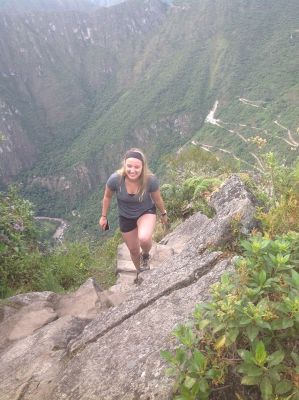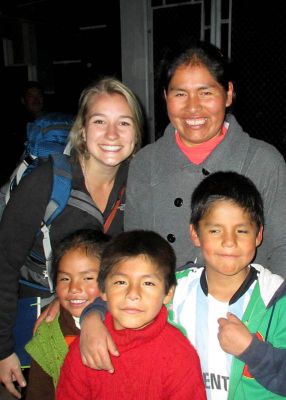Sharing the Wonder of Pachamama

Hayley shares a journal entry:
Looking back, it seem surreal. But somehow I know that, yes, the mountains were that tall, the view was that beautiful, the clouds did move over the peaks, the people clambering by me were seemingly every ethnicity but Peruvian — and I was amazed. I was wholeheartedly appreciating the privilege to see a site that most people only see in pictures, before realizing the extent to which this privilege points to inequality.
Machu Picchu is a site that conveys the enormity of the fall from power of the Incas. The abandonment of this maze of stone and earth chronicles one conquest while its “discovery” by a Westerner, Hiram Bingham, tells of yet another.
The walls themselves tell a different story: one of power, beauty and ability. Cliffs suggest that these buildings should not exist at all, not up here. We look down on a river that rushes over smooth rocks, dense stands of trees entangled by vines; we look across at rocky peaks, lightly veiled by wispy clouds, and snowy peaks against a cerulean sky.
Adding to the beauty was the strain in my legs, the sweat of sun and work, the breeze that lifted my hair and the smell of the mountain air. Every vantage point was incredible, from the top of Huayna Picchu, where Machu Picchu looked like a small hamlet in a valley, or from the Sun Gate, which presented Machu Picchu as a prize at the end of a vigorous trail.

All of these points of view felt lacking. I began to see and hear the limits in this space.
I listened to so many languages at every turn. Why was Spanish not the most common? Why didn’t I see any women carrying babies or goods on their backs, in mantas of beautiful colors and patterns? Why was I, a privileged outsider who had no idea of the historical significance of Machu Picchu only six weeks earlier, getting to see this city in the clouds?
As I looked at the most beautiful place I have ever seen, I could not stop thinking about the eyes that would not take in this scene — the bright eyes of my host mom in Lucre, eyes that watch over six children at once or eyes that fix on her husband in love.
Her eyes should see this. Her eyes should see this, her own history; her back should be lucky enough to shoulder only a backpack with food and water for the day; her hands should have the chance to stop moving, fixing, working.
I hope for that day for Delfina, her children and her children’s children. Until then, I feel grateful to take in the wonder of Pachamama, the mother earth.




